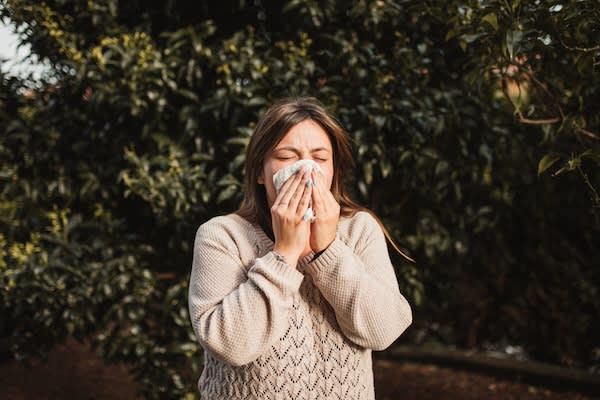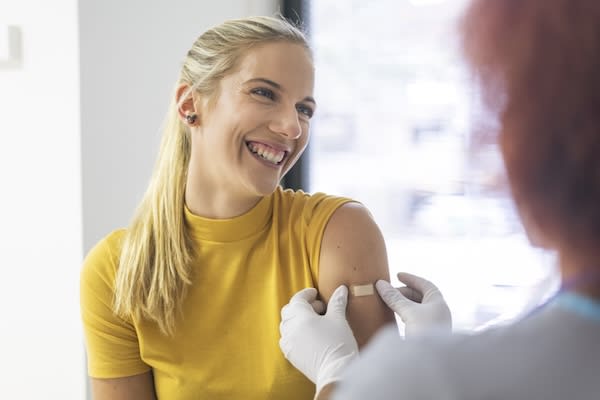What is pollen and why does it cause allergies?
[4 MIN READ]
In this article:
-
Pollen is composed of tiny, grain-like substances created by plants for the purpose of reproduction.
-
Pollen causes allergic reactions — runny noses, itchy and watery eyes, and scratchy throats — when your body mistakenly views it as a threat.
-
Fortunately, there are many ways you can lessen allergy symptoms, including medications and immunotherapy.
What is pollen, and why does it cause allergies?
If you suffer from seasonal allergies (often referred to as hay fever), the daily pollen levels may be a particularly important part of the weather forecast for you at certain times of the year. But have you ever stopped to think about what, exactly, pollen is — and why it can lead to runny noses, itchy eyes and a whole host of other problems?
We talked to Alfred Moon, M.D., a Providence allergist who sees patients in Brea, California, about why pollen causes allergies. Read on to learn how you can reduce your exposure this spring, summer and fall.
What is pollen?
Pollen is created by plants as part of the reproductive process. Specifically, it is the “male” part of seed plants that relies on wind or insects to transport themselves to the “female” part of other plants. These tiny, grain-like substances may travel a great distance to fertilize other plants of the same species. Along the way, they may also irritate humans.
“Generally speaking, the pollens that bother humans tend to be the wind-carried pollens,” says Dr. Moon. “The other pollens are usually found on bright-colored flowers that attract insects, which will then help to transport them. These tend not to be so allergenic to humans.”
There are three main types of pollen — tree, grass and weed. The types of pollen that are the most common allergy triggers depend on geography and time of year, says Dr. Moon. “In Southern California, tree pollen predominates in early spring,” he says. “Olive, ash, privet, oak and pine tree pollen are a few of the main types to cause problems. Late spring to summer is when the grass pollen is in full bloom, including Bermuda, Timothy and Rye. Fall tends to be prime time for weed pollen, such as ragweed.”
Why does pollen cause allergies?
Pollen itself is not harmful to humans. However, sometimes, your immune system mistakenly sees the pollen as something it must fight off — a dangerous intruder that poses a threat to your body. If you are allergic to a certain type of pollen, you experience symptoms when harmless water-soluble proteins released by the pollen enter the mucous membranes of your eyes, nose and mouth.
“This occurs after the immune system has been exposed and then ‘sensitized’ to an allergen, which is, in this case, a pollen,” says Dr. Moon. “It eventually manifests with symptoms we associate with allergies: runny and stuffy nose, sneezing, nasal congestion and itchy eyes.”
Tips for managing pollen allergies
Some of the best ways to minimize your allergy symptoms include keeping windows closed and using air conditioning instead — especially during peak allergy season.
But, of course, it’s impossible to completely isolate yourself from the environment. That’s why many people use over-the-counter decongestants, non-drowsy antihistamines such as Allegra, Zyrtec and Claritin; nasal steroid sprays such as Flonase and Nasonex; and nasal antihistamines such as Astepro. “Many patients require the use of multiple of these medicines,” says Dr. Moon.
Beyond this, allergy immunotherapy, more commonly known as “allergy shots,” is another treatment option that’s often used when these medicines don’t sufficiently control symptoms. “This is a long-term course of treatment (three to five years),” says Dr. Moon, “but it provides significant symptom control, decreased need for medicines and improved quality of life that will last for years — even after active treatment has stopped.”
Dr. Moon adds that a variant of “allergy shots” is to use either liquid drops or dissolvable pills placed under the tongue. “This is relatively newer than the injection treatment, and coverage and cost many times limit its use,” he says.
Because so many people suffer from pollen allergies, there are many different treatments available.
How to reduce exposure to pollen
Ultimately, symptom management is all about keeping as far away from pollen as you can. That includes watching the daily pollen counts, and then making plans accordingly. “If it’s not possible to stay inside during particularly bad days in pollen season,” says Dr. Moon, “then, upon returning home from a picnic or an outdoor hike, consider showering and changing clothes. You can also use a saline irritation/rinse to clear out your nasal passages.”
Learn more about allergy relief at Providence
At Providence, our allergists and immunologists can help you manage your allergy symptoms so you can enjoy your life — even during peak allergy season. They can work with you to determine exactly what substances you’re allergic to, and the best strategies to mitigate symptoms.
Providence providers treat both adults and children, offering avoidance advice, medications and immunotherapy. They will help you breathe easier, and give you strategies to take away some of the misery of seasonal allergies.
Find a doctor
If you are looking for a Providence allergist, search for one in our provider directory.
Through Providence ExpressCare Virtual, you can access a full range of health care services from the comfort of your own home. For same day care, check out Providence ExpressCare locations.
Download the Providence app
It’s all in the app: easily stay connected with Providence and your health. With the Providence app, you can schedule appointments, have virtual visits from the comfort of your own home, get health recommendations personalized for you, access your health records and so much more. Learn more and download the app.
Related resources
Asthma and allergies: Take control of your symptoms
This information is not intended as a substitute for professional medical care. Always follow your health care professional’s instructions.




